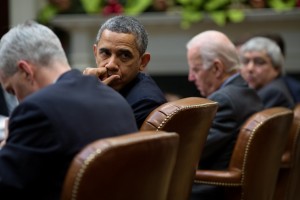
Submitted by Robert Parry via The Strategic Culture Foundation,
Any fair judgment about Barack Obama’s presidency must start with the recognition that he inherited a dismal situation from George W. Bush: the U.S. economy was in free-fall and U.S. troops were bogged down in Iraq and Afghanistan. Clearly, these intertwined economic and foreign policy crises colored how Obama viewed his options, realizing that one false step could tip the world into the abyss.
President Barack Obama, with Vice President Joe Biden, attends a meeting in the Roosevelt Room of the White House, Dec. 12, 2013. (Official White House Photo by Pete Souza)
It’s also true that his Republican rivals behaved as if they had no responsibility for the messes that Obama had to clean up. From the start, they set out to trip him up rather than lend a hand. Plus, the mainstream media blamed Obama for this failure of bipartisanship, rewarding the Republicans for their nihilistic obstructionism.
That said, however, it is also true that Obama – an inexperienced manager – made huge mistakes from the outset and failed to rectify them in a timely fashion. For instance, he bought into the romantic notion of a “Team of Rivals” with his White House trumpeting the comparisons to Abraham Lincoln (although some of Lincoln’s inclusion of rivals actually resulted from deals made at the 1860 Republican convention in Chicago to gain Lincoln the nomination).
In the real world of modern Washington, Obama’s choice of hawkish Sen. Hillary Clinton to be his Secretary of State and Republican apparatchik Robert Gates to remain as Secretary of Defense – along with keeping Bush’s high command, including neocon favorite Gen. David Petraeus – guaranteed that he would achieve little real foreign policy change.
Indeed, in 2009, this triumvirate collaborated to lock Obama into a futile counterinsurgency escalation in Afghanistan that did little more than get another 1,000 or so U.S. soldiers killed along with many more Afghans. In his memoir Duty, Gates said he and Clinton could push their joint views – favoring more militaristic strategies – in the face of White House opposition because “we were both seen as ‘un-fireable.’”
Seasoned Operatives
So, Obama’s rookie management mistake of surrounding himself with seasoned Washington operatives with a hawkish agenda doomed his early presidency to maneuvering at the edges of change rather than engineering a major – and necessary – overhaul of how the United States deals with the world.
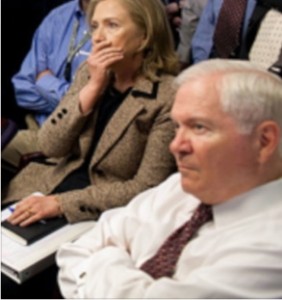
Defense Secretary Robert Gates and Secretary of State Hillary Clinton on May 1, 2011, watching developments in the Special Forces raid that killed Osama bin Laden. Neither played a particularly prominent role in the operation. (White House photo by Pete Souza)
Obama may have thought he could persuade these experienced players with his intellect and charm but that is not how power works. At moments when Obama was inclined to move in a less warlike direction, Clinton, Gates and Petraeus could easily leak damaging comments about his “weakness” to friendly journalists at mainstream publications. Obama found himself consistently under pressure and he lacked the backbone to prove Gates wrong by firing Gates and Clinton.
Thus, Obama was frequently outmaneuvered. Besides the ill-fated counterinsurgency surge in Afghanistan, there was his attempt in 2009-10 to get Brazil and Turkey to broker a deal with Iran in which it would surrender much of its enriched uranium. But Israel and the neocons wanted a “regime change” bombing strategy against Iran, leading Secretary Clinton to personally torpedo the Brazil-Turkey initiative (with the strong support of The New York Times’ editorial page) as Obama silently acquiesced to her insubordination.
In 2011, Obama also gave in to pressure from Clinton and one of his key advisers, “humanitarian” warmonger Samantha Power, to support another “regime change” in Libya. That U.S.-facilitated air war devastated the Libyan military and ended with Islamic militants sodomizing Libyan leader Muammar Gaddafi with a knife and then murdering him, a grisly outcome that Clinton celebrated with a chirpy rephrase of Julius Caesar’s famous boast about a conquest, as she said: “We came, we saw, he died.”
Clinton was less upbeat a year later when Islamic militants in Benghazi, Libya, killed U.S. Ambassador Christopher Stevens and three other U.S. personnel, launching a scandal that led to the exposure of her private email server and reverberated through to the final days of her failed presidential campaign in 2016.
Second-Term Indecision
Even after Clinton, Gates and Petraeus were gone by the start of Obama’s second term, he continued to acquiesce to most of the demands of the neocons and liberal interventionists. Rather than act as a decisive U.S. president, Obama often behaved more like the sullen teen-ager complaining from the backseat about not wanting to go on a family trip. Obama grumbled about some of the neocon/liberal-hawk policies but he mostly went along, albeit half-heartedly at times.
Prime Minister Benjamin Netanyahu meets with U.S. President Barack Obama in the White House on Nov. 9, 2015. (Photo credit: Raphael Ahren/Times of Israel)
For instance, although he recognized that the idea of “moderate” Syrian rebels being successful in ousting President Bashar al-Assad was a “fantasy,” he nevertheless approved covert shipments of weapons, which often ended up in the hands of Al Qaeda-linked terrorists and their allies. But he balked at a full-scale U.S. military intervention.
Obama’s mixed-signal Syrian strategy not only violated international law – by committing aggression against a sovereign state – but also contributed to the horrific bloodshed that ripped apart Syria and created a massive flow of refugees into Turkey and Europe. By the end of his presidency, the United States found itself largely sidelined as Russia and regional powers, Turkey and Iran, took the lead in trying to resolve the conflict.
But one of the apparent reasons for Obama’s susceptibility to such fruitless undertakings was that he seemed terrified of Israel and its pugnacious Prime Minister Benjamin Netanyahu who made clear his disdain for Obama by essentially endorsing Obama’s 2012 Republican challenger, Mitt Romney.
Although Obama may have bristled at Netanyahu’s arrogance – displayed even during meetings in the Oval Office – the President always sought to mollify the tempestuous Prime Minister. At the peak of Obama’s power – after he vanquished Romney despite Netanyahu’s electoral interference – Obama chose to grovel before Netanyahu with an obsequious three-day visit to Israel.
Despite that trip, Netanyahu treated Obama with disdain, setting a new standard for chutzpah by accepting a Republican invitation to appear before a joint session of Congress in 2015 and urge U.S. senators and representatives to side with Israel against their own president over Obama’s negotiated agreement to constrain Iran’s nuclear program. Netanyahu and the neocons wanted to bomb-bomb-bomb Iran.
However, the Iran nuclear deal, which Netanyahu failed to derail, may have been Obama’s most significant diplomatic achievement. (In his passive-aggressive way, Obama gave Netanyahu some measure of payback by abstaining on a December 2016 motion before the United Nations Security Council condemning Israeli settlements on Palestinian lands. Obama neither vetoed it nor voted for it, but let it pass.)
Obama also defied Washington’s hardliners when he moved to normalize relations with Cuba, although – by 2016 – the passionate feelings about the Caribbean island had faded as a geopolitical issue, making the Cuban sanctions more a relic of the old Cold War than a hot-button issue.
Obama’s Dubious Legacy
Yet, Obama’s fear of standing up consistently to Official Washington’s neocons and cowering before the Israeli-Saudi tandem in the Middle East did much to define his foreign policy legacy. While Obama did drag his heels on some of their more extreme demands by resisting their calls to bomb the Syrian government in 2013 and by choosing diplomacy over war with Iran in 2014, Obama repeatedly circled back to ingratiating himself to the neocons and America’s demanding Israeli-Saudi “allies.”
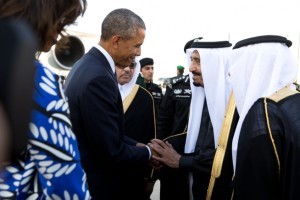
King Salman greets the President and First Lady during a state visit to Saudi Arabia on Jan. 27, 2015. (Official White House Photo by Pete Souza)
Instead of getting tough with Israel over its continued abuse of the Palestinians, Obama gave Netanyahu’s regime the most sophisticated weapons from the U.S. arsenal. Instead of calling out the Saudis as the principal state sponsor of terrorism – for their support for Al Qaeda and the Islamic State – Obama continued the fiction that Iran was the lead villain on terrorism and cooperated when the Saudis launched a brutal air war against their impoverished neighbors in Yemen.
Obama personally acknowledged authorizing military strikes in seven countries, mostly through his aggressive use of drones, an approach toward push-button warfare that has spread animosity against the United States to the seven corners of the earth.
However, perhaps Obama’s most dangerous legacy is the New Cold War with Russia, which began in earnest when Washington’s neocons struck back against Moscow for its cooperation with Obama in getting Syria to surrender its chemical weapons (which short-circuited neocon hopes to bomb the Syrian military) and in persuading Iran to accept tight limits on its nuclear program (another obstacle to a neocon bombing plan).
In both cases, the neocons were bent on “regime change,” or at least a destructive bombing operation in line with Israeli and Saudi hostility toward Syria and Iran. But the biggest challenge to these schemes was the positive relationship that had developed between Obama and Russian President Vladimir Putin. So, that relationship had to be shattered and the wedge that the neocons found handy was Ukraine.
By September 2013, Carl Gershman, the neocon president of the U.S.-government-funded National Endowment for Democracy, had identified Ukraine as “the biggest prize” and a steppingstone toward the ultimate goal of ousting Putin. By late fall 2013 and winter 2014, neocons inside the U.S. government, including Sen. John McCain and Assistant Secretary of State for European Affairs Victoria Nuland, were actively agitating for a “regime change” in Ukraine, a putsch against elected President Viktor Yanukovych that was carried out on Feb. 22, 2014.
This operation on Russia’s border provoked an immediate reaction from the Kremlin, which then supported ethnic-Russian Ukrainians who had voted heavily for Yanukovych and who objected to the coup regime in Kiev. The neocon-dominated U.S. mainstream media, of course, portrayed the Ukrainian conflict as a simple case of “Russian aggression,” and Obama fell in line with this propaganda narrative.
After his relationship with Putin had deteriorated over the ensuring two-plus years, Obama chose to escalate the New Cold War in his final weeks in office by having U.S. intelligence agencies leak unsubstantiated claims that Putin interfered in the U.S. presidential election by hacking and publicizing Democratic emails that helped Trump and hurt Hillary Clinton.
Smearing Trump
The CIA also put in play salacious rumors about the Kremlin blackmailing Trump over a supposed video of him cavorting with prostitutes in a Moscow hotel. And, according to The Wall Street Journal, U.S. counterintelligence agents investigated communications between retired Gen. Michael Flynn, Trump’s national security advisor, and Russian officials. In the New McCarthyism that now surrounds the New Cold War, any conversation with Russians apparently puts an American under suspicion for treason.
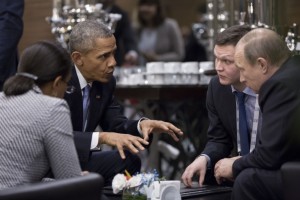
President Barack Obama meets with President Vladimir Putin of Russia on the sidelines of the G20 Summit at Regnum Carya Resort in Antalya, Turkey, Sunday, Nov. 15, 2015. National Security Advisor Susan E. Rice listens at left. (Official White House Photo by Pete Souza)
The anti-Russian frenzy also pulled in The New York Times, The Washington Post and virtually the entire mainstream media, which now treat any dissent from the official U.S. narratives condemning Moscow as prima facie evidence that you are part of a Russian propaganda apparatus. Even some “progressive” publications have joined this stampede because they so despise Trump that they will tout any accusation to damage his presidency.
Besides raising serious concerns about civil liberties and freedom of association, Obama’s end-of-term anti-Russian hysteria may be leading the Democratic Party into supplanting the Republicans as America’s leading pro-war party allied with neocons, liberal hawks, the CIA and the Military-Industrial Complex – in opposition to President Trump’s less belligerent approach toward Russia.
This “trading places” moment over which party is the bigger warmonger could be another profound part of Obama’s legacy, presenting a crisis for pro-peace Democrats as the Trump presidency unfolds.
The Real Obama
Yet, one of the mysteries of Obama is whether he was always a closet hawk who just let his true colors show over the course of his eight years in office or whether he was a weak executive who desperately wanted to belong to the Washington establishment and underwent a gradual submission to achieve that acceptance.
I know some Obama watchers favor the first answer, that he simply bamboozled people into thinking that he was an agent for foreign policy change when he was always a stealth warmonger. But I tend to take the second position. To me, Obama was a person who – despite his intelligence, eloquence and accomplishments – was never accepted by America’s predominantly white establishment.
Because he was a black male raised in a white family and in a white-dominated society, Obama understood that he never really belonged. But Obama desperately wanted to be part of that power structure of well-dressed, well-schooled and well-connected elites who moved with such confidence within the economic-political system.
An instructive moment came in 2014 when Obama was under sustained criticism for his refusal to bomb the Syrian military after a sarin gas attack outside Damascus that was initially blamed on the government though later evidence suggested that it was a provocation committed by Al Qaeda’s Syrian affiliate.
Despite the uncertainty about who was responsible, the neocons and liberal hawks deemed Obama “weak” for not ordering the bombing strike to enforce his “red line” against chemical weapons use.
In a 2016 article in The Atlantic, Obama cited his sarin decision as a moment when he resisted the Washington “playbook” that usually favors a military response. The article also reported that Obama had been informed by Director of National Intelligence James Clapper that there was no “slam dunk” evidence pinning the attack on the Syrian military. Yet, still Obama came under intense pressure to strike.
A leader of this pressure campaign was neocon ideologue Robert Kagan, an architect of the Iraq War and the husband of Assistant Secretary of State Nuland. Kagan penned a long essay in The New Republic entitled “Superpowers Don’t Get to Retire.” A subsequent New York Times article observed that Kagan “depicted President Obama as presiding over an inward turn by the United States that threatened the global order and broke with more than 70 years of American presidents and precedence.”
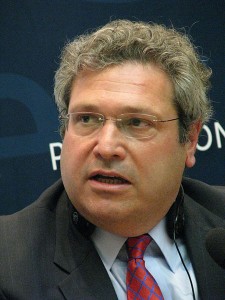
Prominent neocon intellectual Robert Kagan. (Photo credit: Mariusz Kubik, https://www.mariuszkubik.pl)
Kagan “called for Mr. Obama to resist a popular pull toward making the United States a nation without larger responsibilities, and to reassume the more muscular approach to the world out of vogue in Washington since the war in Iraq drained the country of its appetite for intervention,” the Times article read.
Obama was so sensitive to this criticism that he modified his speech to the West Point graduation and “even invited Mr. Kagan to lunch to compare world views,” the Times reported. A source familiar with that conversation described it to me as a “meeting of equals.”
So, Obama’s subservience to the neocons and liberal hawks may have begun as a case of an inexperienced president getting outmaneuvered by rivals whom he had foolishly empowered. But Obama’s descent into a full-scale New Cold Warrior by the end of his second term suggests that he was no longer an overpowered naïf but someone who had become a committed convert.
How Obama reached that point may be less significant than the fact that he did. Thus, the world that President Obama bequeaths to President Trump may not have all the same dangers that Bush left to Obama but the post-Obama world has hazards that Obama did more to create than to resolve — and some of the new risks may be even scarier.